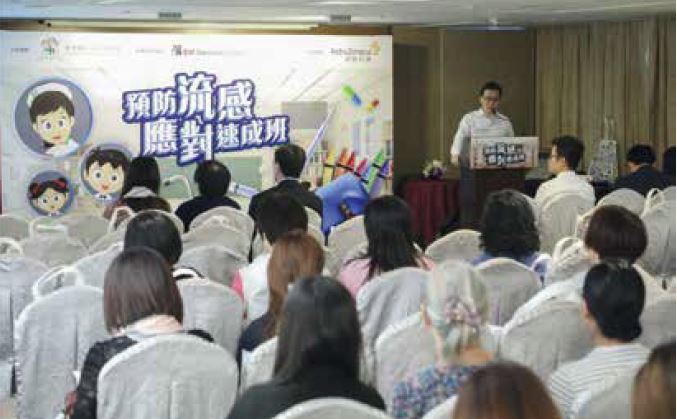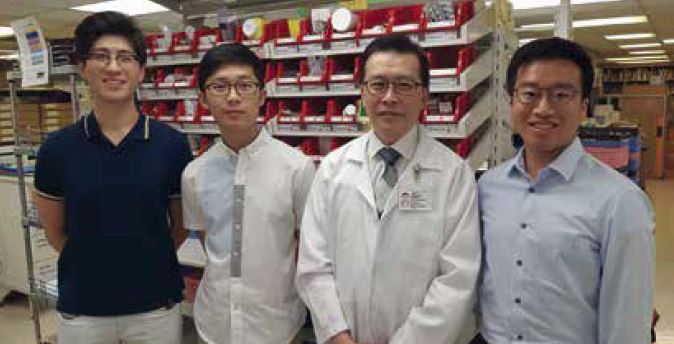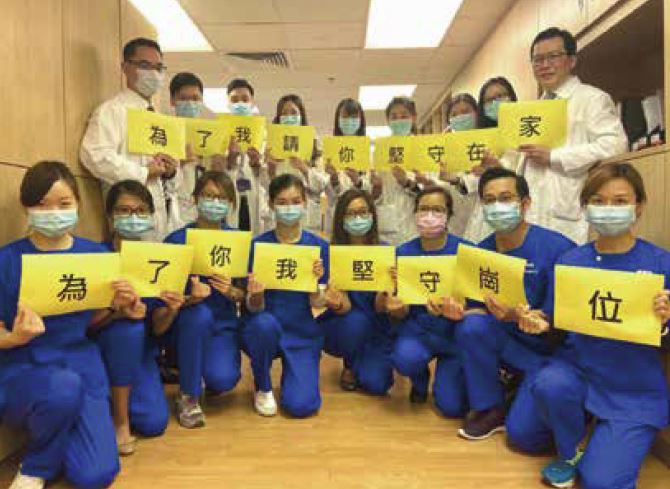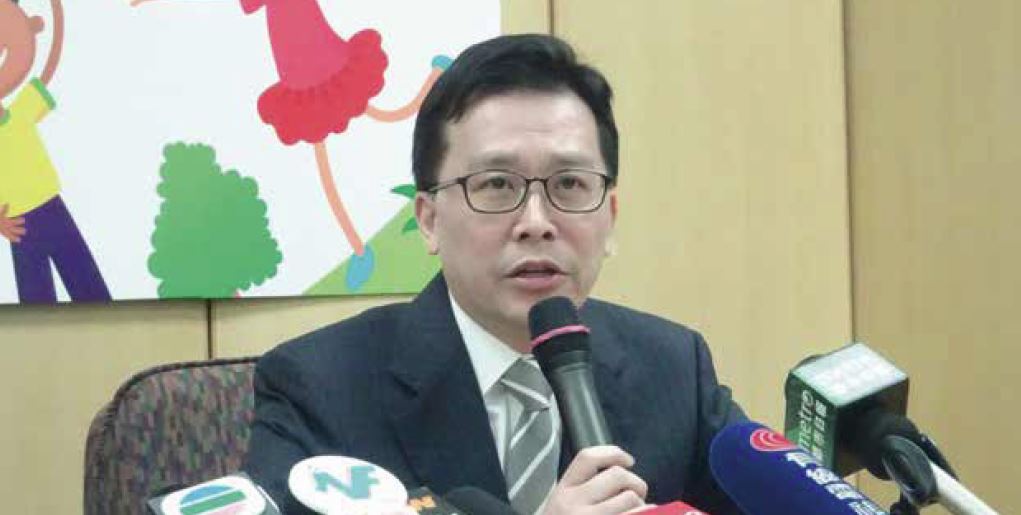Hong Kong Academy of Medicine. CC BY-NC-ND 4.0
HEALTHCARE FOR SOCIETY
Visionary in the field of pharmacy: an interview with Mr William Chun-ming Chui
Gordon Chin1, Justin Leung2, William Xue3
1 Year 3, The Chinese University of Hong Kong
2 Year 4, The Chinese University of Hong Kong
3 Year 6, The Chinese University of Hong Kong
As President of the Society of Hospital Pharmacists
of Hong Kong (SHPHK) since 2012, Mr William
Chun-ming Chui has actively promoted drug
and health education both in print and in media,
hoping to empower the public participating in the
decision-making process for health management
together with healthcare professionals. Mr Chui is
also a passionate advocate for pharmacists and has
called for reform of these underutilised healthcare
professionals to alleviate the overstretched public
healthcare system in Hong Kong.
Serving with motivation and vision
Throughout the years, Mr Chui’s efforts have
mostly revolved around a common theme: patient
empowerment through acquisition of drug
knowledge. “Knowledge is power”, he said. After all,
patients must understand their treatment options
if they are to participate in the decision-making
process of their care. Meanwhile, patient education
on the indication, efficacy, and safety side-effect
profile of drugs may facilitate drug adherence. For
instance, when patients are well informed that some
antihypertensives cause postural hypotension, they
could better anticipate it and learn to cope, such as
by taking their drugs just before sleep at the initial
stage of the new drug treatment. Pharmacist could
counsel patients on side-effect management and
solve patients’ drug-related problems in order to
achieve optimal therapeutic outcomes.
In addition to patient empowerment, Mr Chui
has a vision to redefine the roles that pharmacists can play. After graduating from the United Kingdom, Mr
Chui returned to Hong Kong and found that the local
pharmacists were heavily underutilised. Whereas
pharmacists working in the United Kingdom are
multifunctional, those working in Hong Kong are
often limited to drug dispensing duties. Yet, it is his
firm belief that pharmacists in Hong Kong can and
should play a bigger role in the healthcare system.
“Patients always ask about drug treatment”, said
Mr Chui. As experts in medicines and their usage,
pharmacists are more than capable of dealing with
drug-related issues and enquiries. Doctors could
then focus on taking care of the big picture. “Nurses
are the doctor’s right hand, and pharmacists are
the left hand,” he added. Mr Chui always motivates
hospital pharmacists to use their clinical skill and
knowledge to assist doctors for improving the safety
and quality of care for patients.
Working as a clinical pharmacist
with sense of mission
In addition to his passion for patient-centred care,
Mr Chui actively promotes the expertise of hospital
pharmacists. He was instrumental in introducing
the Clinical Pharmacist Service at Queen Mary
Hospital in 1994, which was the first such service
to be introduced in the Hospital Authority. Clinical
pharmacists have grown to become indispensable
players in the healthcare team. Their duties include
formulation of drug treatment strategy; medication
review and drug counselling for patients; and
consultations on drug-related issues such as dosage and drug–drug interactions; and review of new
drug treatments. This clinical service was widely
acclaimed and was then expanded to other regional
hospitals in 1996. Currently, Queen Mary Hospital is
conducting another pilot scheme in allowing clinical
pharmacists to prepare discharge prescriptions
in three medical wards, hoping to alleviate the
workload of doctors especially junior doctors, and to
speed up the discharge of patients.
Mr Chui has also spent his time implementing
initiatives for promoting better drug management
and patient choice. One of these initiatives was
the Queen Mary Hospital Drug Formulary that,
when it was introduced in 1991, was the first drug
formulary in the Hospital Authority. Recently, in
response to the COVID-19 pandemic, Mr Chui and
his pharmacist team published the Interim Drug
Treatment Handbook for COVID-19. This book,
available in electronic and print formats, reviews
the latest literature on potential drug treatments
for the virus, hoping to provide an updated and
comprehensive reference for use when treating
infected patients. The team also prepared a
COVID-19 fact sheet in both Chinese and English
for the public, including a list of the known routes
of transmission and prevention measures, providing
the public with more information to safeguard their
own health. Despite the laborious task of keeping
these publications up-to-date, Mr Chui stated that
it would be a waste to keep all the knowledge to
ourselves without disseminating it to his colleagues,
other healthcare professionals, and more importantly
the general public.
Bringing pharmaceutical
knowledge to the public
In addition to pioneering change within the system,
Mr Chui has spearheaded the role of pharmacists
in empowering the public through drug education.
The public may be most familiar with his frequent
appearances in the media. As President of the SHPHK,
he has been the spokesperson for pharmacists
regarding issues ranging from medication incidents
to the logistics of COVID-19 vaccine distribution.
Mass media is key for disseminating
pharmaceutical information, advocacy, and
influencing policy making of the government.
However, as Mr Chui notes, exploiting the media
successfully to achieve these requires healthcare
professionals to demonstrate media savvy. He
reminds us that the goal is to understand the
audience and pre-emptively answer their questions,
not to demonstrate how much one knows. Increasing
public awareness requires concisely summarising the
relevant facts, explaining issues in layman’s terms,
and providing possible solutions after incidents
occurred.
Not everyone may have noticed, but Mr
Chui ensures that he always appears together
with a medical doctor during press conferences.
As a pharmacist, he shares his expertise in drug
treatment, while leaving the discussion of symptoms
and diagnosis to the doctor. This is an intentional
choice, meant to highlight how pharmacists are not
meant to replace doctors, but rather to play a key
partnership role in patient care.
Mr Chui reveals that his proudest achievement
was the establishment of the Drug Education
Resource Centre (DERC) in 2002, a non-profit
organisation under the SHPHK, which provides free
drug information and education to patients and the
general public. In line with the SHPHK’s mission of
promoting the advancement and improvement of
hospital pharmacy services, the DERC advocates
for drug education and shared decision-making by
doctors and patients when choosing treatments.
In addition to publishing a plain language guide to
common diseases and pharmacological treatment,
the DERC website also provides access to drug-related articles and videos, such as demonstrations
by pharmacists on the proper use of inhalers
for patients with asthma or chronic obstructive
pulmonary disease.
Mr Chui stresses that medical information
should be written by professional healthcare workers or medical writers, rather than nonprofessionals.
Credibility is especially crucial in the
modern era, where we are constantly bombarded
with information, and so the content that the DERC
publishes is all directly produced by pharmacist
volunteers. Moreover, the DERC often partners with
patient support groups in order to assess the actual
needs of patients and to obtain feedback from them.
Parting words
Mr Chui’s vision has remained resolute throughout
his years of service. It has been his wish to inspire
junior or trainee pharmacists to recognise how their
profession could contribute to the bigger picture. Mr
Chui was honoured to have the support of his team
of young pharmacists. “Don’t do it for self-interest,”
he says, “we do it for the public and the profession
through teamwork.” He reminds us of the impact
pharmacists can have with a tale of an 80-yearold
patient taking multiple drugs who burst into
tears at the Pharmaceutical Care Clinic after being
reassured, “Your symptoms were actually common
adverse effects of the drug treatment rather than
the deterioration of your disease condition. You
have tried your best.” The motto of the DERC is very
touching: “Drugs cure diseases; hearts cure patients
用藥醫病 用心醫人”.

Mr Chui at a community lecture on influenza vaccination, co-organised by SHPHK for kindergarten principals and teachers (Photo courtesy of Mr Chui)

Mr Chui (second from right) with student journalists (from left: William, Gordon and Justin) at Queen Mary Hospital

Mr Chui (top right) and his pharmacist team. Mr Chui has his mask off to reflect where people can safely take off their masks: at home (Photo courtesy of Mr Chui)


